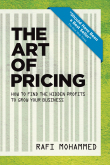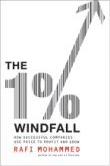The Psychology of Pricing
If I’ve said it once, I’ve said it a million times…pricing is all about capturing the value customers place on your product. And while value should be the foundation of your price, there is a growing interest of incorporating behavioral economics in setting prices. For example, while there’s not much difference between a price of $99.99 and $100 – psychologically, it’s not unusual for customers to view $99.99 as being significantly lower than the $100 price tag. In chapter 9 of The Art of Pricing, I discuss many of these behavioral economics tactics and how to use them to apply “finishing touches” to your value based price.
I thought it would be interesting to discuss some path breaking research conducted by Richard Thaler. Thaler is an economics professor at the University of Chicago and many consider him to be a shoo-in to receive an economics Nobel Prize. I overlapped with Dick at Cornell University (he was a professor, I was a grad student). I used to hang out in his office and discuss pricing strategies. In fact, he once set me up to be interviewed by the ABC television show “Primetime Live” for a segment on concert ticket prices. Sadly…the only person to see that interview was the janitor as s/he swept up remnants on the cutting room floor.
Dick conducted an interesting experiment in his MBA classes on the role of reference prices (prices embedded in consumers’ minds that serve as a foundation to decide if a price is fair). Thaler described the following scenario to two of his classes:
You are lying on the beach on a hot day. For the last hour you have been thinking about how much you would enjoy an ice cold bottle of your favorite beer. A companion gets up to make a phone call and offers to bring back a beer from the only nearby place where beer is sold. He says that the beer may be expensive and so asks how much you are willing to pay for the beer. He says that he will buy the beer if it costs as much or less than the price you state. But if it costs more than the price you state he will not buy it. You trust your friend…what price do you tell him? (note: I shortened this scenario).
In one class, Professor Thaler said the friend was going to buy the beer from a fancy hotel. To the other class, he indicated the friend was going to buy the beer from a small run-down grocery store. The results were fascinating: the median response for the two different versions of the experiment was $2.65 (fancy resort hotel) and $1.50 (run-down grocery store)…boy it’s been a long time since I’ve seen those prices…this experiment was run in 1984.
What’s interesting is from a value standpoint, the products are identical. The respondent gets to remain at the beach basking in the sun – the product is the friend bringing back a bottle of beer. It shouldn’t really matter where the beer comes from. But as you can see from the experiment results, consumers tend to use historical reference prices as a benchmark to determine value. They were willing to pay 77% more simply if the beer comes from a fancy hotel instead of the grocery store. For more information on this experiment, please see Dick’s paper “Mental Accounting and Consumer Choice.” [Marketing Science, 4(1985), pp 199-214].
So how do you incorporate reference prices affect your pricing? It all goes back to the Value Decoder... First, reference prices set the standard as competing product prices. For example, just yesterday a friend and I were discussing the reunion tour of the rock group Genesis. Shockingly…the first question I asked was what are ticket prices? I found his answer interesting. Wincing with a hint of disgust, he replied “the same as all of the other top tours…$200.” Don’t worry Genesis, despite his complaining, I’m sure my friend will be at your show. Second, if your price deviates from the reference price “norm” - just as the Value Decoder advocates, you need to justify your price. If you are raising prices – explain why – common explanations include raw input price increases (since we all visit the gas pump every week, we all can relate to higher oil prices), a portion of the price is being donated to charity, and of course, point out the enhanced value of your product.
Please feel free to send me any questions or comments. I update this blog two to three times a week – please consider signing up to be notified by e-mail of a new blog post. Thanks for taking the time to read my blog.
Readers' Comments on This Blog Entry
I am not sure if the conclussion is that consumers use historical data, or that simply put, a beer from a "fancy hotel" has more value than a beer from a "grocery store"...





Great blog Rafi. Also true is if you're on a week's vacation while on that same beach you'll probably pay more than you would on a day trip. It's also about how much you consider you deserve that product.